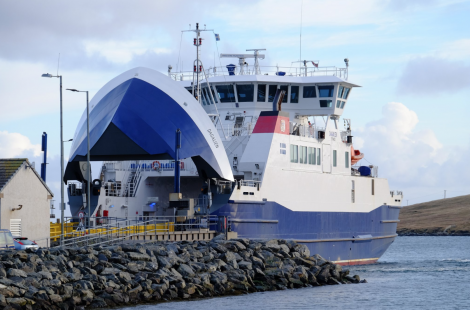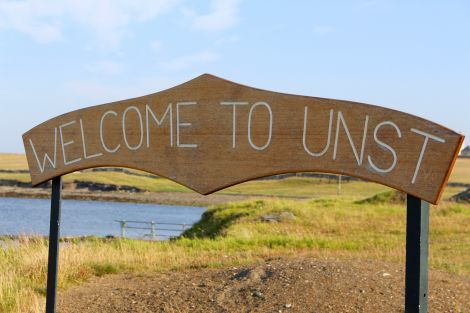Transport / ‘We are doing everything we can to minimise disruption’ says SIC ferry chief
Staff vacancies and absences have particularly affected services to Yell, Unst and Fetlar, with disruption continuing this week
FERRY bosses say they are doing their “level best” to grapple with staff vacancies and absence which is continuing to disrupt services in the North Isles.
Shetland Islands Council’s ferry and airport operations and port infrastructure manager Andrew Inkster said it was “not a satisfactory situation for anybody of us”.
The service to and from Yell was reduced to a single vessel yesterday (Thursday) because of crew sickness, with reports of 40-plus vehicles at one point queuing at Toft on the mainland.
Bluemull Sound – which runs to Unst and Fetlar – is also operating with a single vessel today, for the same reason, with extra runs put in where possible. The route was also affected on Thursday and Wednesday afternoon.
But it is nothing new – disruptions to these services have been a recurring feature this year, not only through staffing issues but breakdowns too, causing frustration among the community.
Reduced services can have a human impact too. At the end of May Eric Burgess-Ray missed his brother’s funeral on the UK mainland after he could not get off Unst in time to make the NorthLink ferry south from Lerwick.
The ferry service to Yell had been temporarily suspended due to a lack of available staff.
“I felt bad for my brother’s family down there that I wouldn’t be there,” he said.
“I had to rebook everything, it cost me another £85 for the train, and eventually when I did get there it was about five hours after his funeral.”
Meanwhile a freedom of information request shows that during the period of 2018 to the end of March this year there were 55 days which saw breakdown disruption across the Yell and Bluemull services, and 27 related to crew issues.
Become a member of Shetland News
In addition to this there were also delays to drydock schedules earlier this year, while weather naturally put paid to a number of sailings.
In an interview with Shetland News this week, Inkster admitted that recruitment issues on the North Isles services are having a significant effect their day to day running.
He also said:
- The council has lost some key ferry staff to the salmon sector, which offers competitive pay and shift patterns
- Agency staff has needed to be drafted in to keep ferries running
- Work is ongoing in the background to look at ways to make ferry jobs more attractive, including shift patterns
- Staff have been subjected to a “significant degree of discontent from the travelling public”
Inkster said the ferry service has lost a number of key staff through natural movement, such as retirals.
But as the economy opens up again following the worst of the Covid pandemic, the ferries have also lost a few members of staff to other areas of industry.
The salmon industry is one sector proving attractive to people with marine qualifications.
Add in staff sickness from Covid, with a requirement to have a minimum number of qualified staff on board, there is sometimes no option but to tie up the boat.
Inkster said this is the “very last resort”.
He said he understands the concern from industry – the salmon sector has also expressed worry about the reliability of the service from Yell – and is happy to speak to interested parties.
But Inkster is also keen to engage more with local community councils.
The council has more than 100 people working on its inter-island ferries, which also includes routes like Whalsay, Skerries, Fair Isle and Papa Stour, as there needs to be more than one crew for each vessel.
There are currently five vacancies on the ferries, including one in Bressay, as well as a couple of relief staff jobs going.
Struggling to fill vacancies is not just a problem for the ferries – areas like education and social care are also having difficulties.
“We’ve had a number of posts that we simply haven’t been able to recruit to,” Inkster explained.
“Despite our best efforts, we’ve had a number of interviews lined up and then at the last minute candidates have pulled out.”
He said “whether we like it or not we’ve had to rely on agency staff” – workers who are resourced on a temporary basis.
“It’s not an ideal situation but for as long as we can get agency staff we’ve been able to get vessels going,” Inkster continued.
“But because of a number of vacant posts coupled with an increase incidence of sickness, we have seen particular issues in these last few months. No doubt about that.”
Agency staff are usually associated with higher costs, but Inkster said the council has been able to dictate pay terms, “and we’ve been able to attract agency staff on broadly similar packages to what our full time staff would get”.
But he warned this could change as other marine industries ramp up again following Covid restrictions. “It may become more difficult for us to attract staff at those rates and we may have to start offering inflated terms to try and attract them to come to us.”
So what are the solutions? It appears ferry bosses have their hands tied somewhat; offering more money for staff jobs is a matter for the council as a whole and “not an easy fix”, Inkster said.
“The council’s single status is a nationally agreed set of pay, terms and conditions – it’s not something that’s easily changed,” he added.
“There are opportunities to look at market forces for individual roles but that’s quite a prolonged, complicated process which doesn’t allow us to react to threats and opportunities.
“But what we are trying to do is look at possibly the shift patterns and some of the other areas where we perhaps can help out staff and make the jobs a wee bit more attractive.”
Making it easier for people to get into jobs on ferries is also a problem, due to strict certification and qualification requirements governed by the Maritime and Coastguard Agency (MCA).
This includes conditions related to how long people have worked at sea.
While the council does have a significant number of ferry staff, it is not always possible to draft in workers from a different vessel as they may not be familiarised with the ferry or have the right tickets.
“It’s not just a case of going to college and getting the certification – the sea time needs to be built up to demonstrate your experience and competence,” Inkster added.
“We do have one or two areas where we have taken on trainee deckhands.
“Bressay is a good example, where we’ve taken on people who have effectively had no qualifications whatsoever, and as long as they can get the medical that is required, then we can take them through a process where they can gain their qualifications to be a deckhand.”
But that does not offer a quick fix, with Inkster saying the process could potentially take candidates around 18 months, depending on shift criteria. He added that it could also take around five years to get to a point where they can sit officer of the watch exams.
“There could be other models of certification, but again they’re not easy to implement at short notice,” Inkster explained.
“Our intention is to try to recruit to the vacancies that we have. A change to a different certification schedule would be pretty fundamental and an awful lot of work.
“When we can’t meet those standards for various reasons we have no option but to tie up vessels.”
Against a clamour for fixed links from politicians and many in the community, council’s ferry fleet is also ageing, and as a result maintenance time is likely to increase.
Even the newer vessels, such as the Dagalien in the Yell route, are 20 years old.
“We’re having tremendous problems at the moment with the supply of materials,” Inkster added.
“Some of the spare parts that we need are months and months away from being delivered.”
The freedom of information request results highlight that to the end of March there were 10 days of disruption on the Yell and Bluemull services due to breakdowns this year, largely on the Yell route.
In the first couple of months of the year delays with scheduled drydocking also affected Bluemull Sound.
Inkster concedes that the public perception of ferries is not great at the moment, but he said people do not generally see the hard work behind the scenes.
“The crews on board the vessels are subjected to a significant degree of discontent from the travelling public, both in person and also on social media, and also on me and my team at the office at Sella Ness,” he said.
“People are doing their level best to keep services going, but without that key resources in terms of staff it’s very, very difficult.”
Sheena Summers, a team leader at Sella Ness, also said booking staff have also faced frustration from travellers.
“The public really have to realise that the lasses in the booking office are not a punchbag, and they do seem to get a lot of it – even from people on holiday,” she said. “They really do get a lot of abuse.”
With continued incidences of Covid illness, and the summer holidays coming up, Inkster conceded “I don’t think we can make any guarantees” that the situation will improve in the immediate future.
However he stressed that staff are continuing to try their best to mitigate the impacts.
Become a member of Shetland News
Shetland News is asking its readers to consider paying for membership to get additional perks:
- Removal of third-party ads;
- Bookmark posts to read later;
- Exclusive curated weekly newsletter;
- Hide membership messages;
- Comments open for discussion.
If you appreciate what we do and feel strongly about impartial local journalism, then please become a member of Shetland News by either making a single payment, or setting up a monthly, quarterly or yearly subscription.
















































































